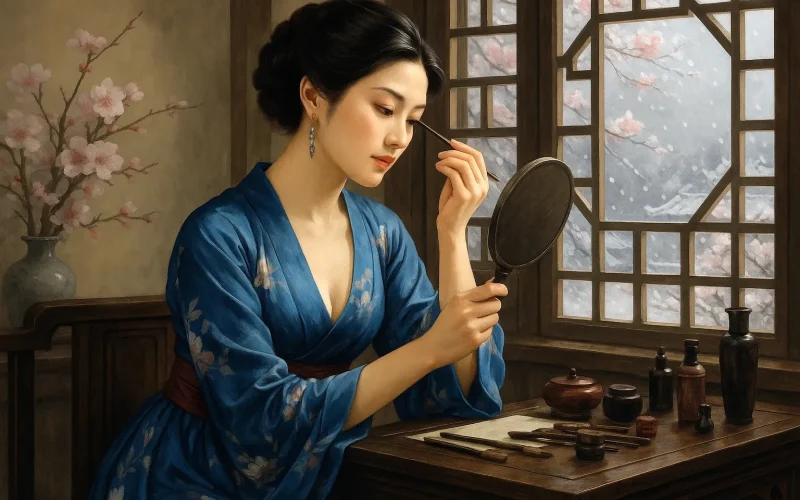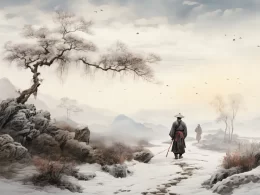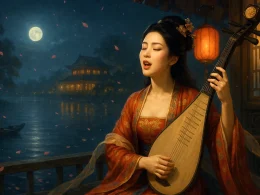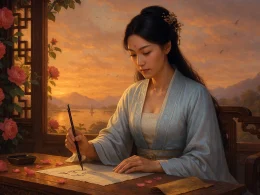Morning chill: uprolled the drape, light frost;
Breathing on hands, she tries the mume-blossom makeup.
Only because she nurses parting grief,
She pencils her brows long as distant hills.
Thinking of the past,
Regretting lost fragrance—
Too easy to wound the heart.
She would sing, but first checks herself;
Would smile, yet still frowns—
Nothing more heartbreaking than this.
Original Poem
「诉衷情 · 眉意」
欧阳修
清晨帘幕卷轻霜,呵手试梅妆。
都缘自有离恨,故画作远山长。
思往事,惜流芳,易成伤。
拟歌先敛,欲笑还颦,最断人肠。
Interpretation
Composed during the mid-Northern Song period, this lyrical miniature adopts the "persona voice" (代言体) tradition, delicately portraying a woman's psychological state entangled in separation melancholy. While Ouyang Xiu's oeuvre often engages grand themes of political ideals and existential reflection, this work exemplifies his mastery in depicting boudoir sentiments and subtle romantic nuances, showcasing his remarkable artistic versatility.
First Stanza: "清晨帘幕卷轻霜,呵手试梅妆。都缘自有离恨,故画作远山长。"
Qīng chén lián mù juǎn qīng shuāng, hā shǒu shì méi zhuāng. Dōu yuán zì yǒu lí hèn, gù huà zuò yuǎn shān cháng.
Morning frost drifts through uprolled screens,
She breathes on chilled hands to trace mume-blossom brows.
This growing distance in her—
These elongated hills—
Each stroke a silent vow.
The stanza constructs an intimate chamber scene where physical and emotional temperatures intertwine. The "mume-blossom makeup" (梅妆) represents cosmetic artifice masking inner turmoil, while the "elongated hills" (远山长) of her eyebrows become cartographic projections of emotional distance. The act of breathing warmth onto cold hands (呵手) mirrors the paradox of self-comfort amidst irreparable separation.
Second Stanza: "思往事,惜流芳,易成伤。拟歌先敛,欲笑还颦,最断人肠。"
Sī wǎng shì, xī liú fāng, yì chéng shāng. Nǐ gē xiān liǎn, yù xiào huán pín, zuì duàn rén cháng.
Memory's tide,
Youth's ebbing light—
How swiftly turns to ache.
Song aborted mid-breath,
Smile collapsing to ache,
This pendulum-break
Could snap the soul in twain.
Here, psychological turbulence manifests through aborted gestures—the choked song (拟歌先敛) and fractured smile (欲笑还颦) embodying emotional stasis. The stanza's structure mirrors its content: the trisyllabic phrases (三字句) create a staccato rhythm of arrested motions, while the final line delivers the visceral payoff of "soul-snapping" (断肠) despair—a masterful enactment of cognitive dissonance through prosody.
Holistic Appreciation
This lyric poem delicately portrays the inner world of a woman grieving the passing of spring. It begins with her morning toilette—the vivid, symbolic gestures of "blowing on her hands" and "distant-hill eyebrows" subtly mirror her psychological state. The middle section reveals the source of her melancholy: "recalling the past, / mourning time’s flight." The concluding lines capture her contradictory expression—"a smile that twists into a frown"—rendering complex emotions with piercing clarity.
Though the poem never explicitly mentions love, every word pulses with longing and separation. By adopting the woman’s voice, the poet expresses emotion with restrained elegance, blending sensual beauty with psychological depth. As Dream of the Red Chamber observes: "Each word reads like blood, / a decade’s labor, uncommonly hard." Brief as it is, this lyric lingers like a frost’s chill, unforgettable in its quiet intensity.
Artistic Merits
- Persona Technique: The entire poem adopts a female perspective, concealing the poet’s identity—a hallmark of Ouyang Xiu’s "borrowed-self lyricism."
- Nuanced Psychological Portrayal: From actions and tone to facial expressions, every detail traces the protagonist’s emotional shifts.
- Elegant Diction, Rich Imagery: "Distant hills," "plum-blossom makeup," and "blowing on hands" are layered and evocative, each deepening the mood.
- Compact Syntax, Lively Rhythm: The staccato lines of the second stanza, like stifled sobs, amplify the emotional weight.
Insights
The poem teaches us that truly moving depictions of emotion rely not on grand declarations but on keen insights into human psychology. Through the persona technique, Ouyang Xiu unveils the intricate emotional tides within a woman’s heart, reflecting a broader shift in Song dynasty aesthetics—from mere scenery and ideals to the minutiae of daily life and the human psyche. Today, in navigating relationships and existence, we too might learn to approach others—and ourselves—with such tenderness and nuance.
Poem Translator
Burton Watson
About the Poet
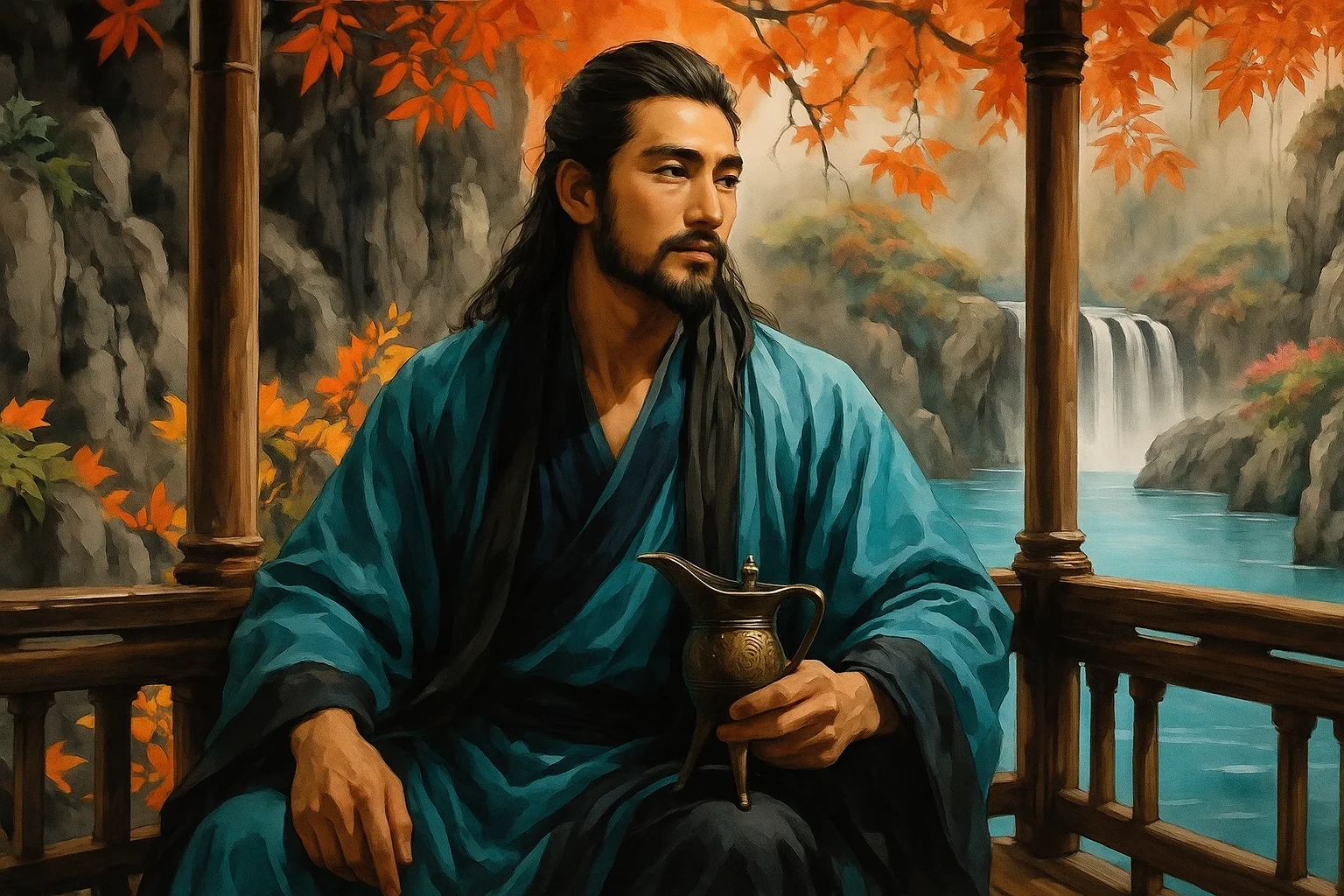
Ouyang Xiu (欧阳修, 1007 - 1072), a native of Yongfeng, Jizhou (present-day Jiangxi Province), emerged as the preeminent literary figure of the Northern Song Dynasty. After attaining the jinshi degree in 1030, he spearheaded a literary reform movement that rejected the ornate Xikun style prevalent at court. As a mentor who nurtured literary giants like Su Shi and Zeng Gong, he laid the foundation for the golden age of Northern Song literature. Recognized as one of the "Eight Great Prose Masters of Tang and Song," Ouyang stands as the pivotal figure in the transformation of Northern Song literary culture.






